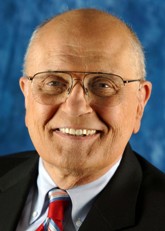Perils of Regional Protectionism
In September of 1990, when a gallon of gas was $1.16, the Senate took up a measure that would have bumped the average fuel efficiency of new cars to 40
Jul 31, 2020155K Shares2.9M Views
In September of 1990, when a gallon of gas was $1.16, the Senate took upa measure that would have bumped the average fuel efficiency of new cars to 40 miles per gallon. Faced with heavy opposition from the nation’s automakers, however, the measure fell three votes shy of passage. Leading the congressional resistance was Michigan’s influential delegation, which stepped in to protect its famously regional industry.
Eighteen years later, the price of gasis flirting with $4 per gallon, the global warming threat is ever-increasing and Detroit’s auto industry is hemorrhaging workers. As America’s big three automakers — Ford, Chrysler and General Motors — struggle to compete with smaller, more fuel efficient imports, a number of environmentalists, watchdog groups and former members of Congress contend that Michigan’s lawmakers bear much of the blame for the industry’s woes.
Illustration by: Matt Mahurin
“For the last 20 years, the Michigan delegation felt that what was good for the big three was good for Michigan,” said Brendan Bell, Washington representative for the Union of Concerned Scientists. “Instead, 20 years of inaction gave the big three the rope to hang themselves with.”
The saga highlights the perils of congressional efforts to protect regional industries. Responding to evolving consumer tastes, America’s automakers focused much of the last two decades on producing larger, less efficient vehicles, exemplified by the sports utility vehicle, or SUV. Attempts by environmentalists and some lawmakers to install higher fuel efficiency standards were thwarted along the way, with the opposition rallying behind Michigan’s powerful representatives, particularly House Energy and Commerce Committee Chairman John Dingell (D) and five-term Sen. Carl Levin (D). Between 1975 and 2007, federal fuel consumption standards remained unchanged.
While the lack of federal intervention proved a boon during the era of low fuel prices, it also allowed the industry to ignore the possibility that those conditions might someday end. As a result, the nation’s auto companies are now left ill-equipped to meet the increasing demand for more fuel efficient cars that’s arrived with rising fuel costs. In the case of Michigan’s automakers, many observers say, the congressional protectionism has come back to haunt them.
Evidence of the industry’s decline has grabbed countless headlines in recent months. The Detroit News revealedWednesday that Ford will cut 10 percent to 12 percent of its salaried workforce — roughly 2,000 people — as early as July due to slumping sales of trucks and SUVs, the company’s bread and butter in recent years.
In April, Ford, Chrysler and GM all reported double-digit dropsin sales, attributable to the same migration of consumer choice. Meanwhile, the more efficient hybrid models, while still just a fraction of the nation’s car sales, are being snatched upas soon as they hit the lot. The trend favors manufacturers like Toyota and Honda, which focused on smaller, more efficient engines in recent decades. Indeed, Toyota last month reported a 54 percent increase in sales of its Prius, the company’s 46-mile-per-gallon electro-petrol hybrid.
Daniel Becker, a Washington-based environmental consultant, said that “a wishful blindness” among Detroit’s congressional supporters has greatly contributed to the divide. “The auto industry has suffered from a number of members of Congress who drank Detroit’s Kool-Aid and protected the industry to death,” Becker said. “They’re now suffering because of their short-sightedness.”
The 1990 proposal for better fuel efficiency was supported by liberal lawmakers, who cited the environmental benefits, and some conservatives, who wanted to wean the country from its thirst for Middle Eastern oil on the eve of the first Gulf War. But opponents argued that the changes would force automakers to make costly adjustments that would hurt bottom lines and force worker layoffs. Then-Michigan Sen. Donald Riegle (D) said the burden on automakers would be “horrendously expensive,” according to a New York Times report, which also noted that opposition from Dingell would have made House passage difficult. Levin, who joined Riegle in voting against the 1990 measure, spearheaded the defeat of a similar push in 2002.
Dennis B. Fitzgibbons, chief of staff to the House Energy and Commerce Committee, said in a phone interview Wednesday that Dingell’s historic opposition to increased fuel standards reflects a belief that Congress has little role — and little power — to dictate the laws of supply and demand.
“You can’t make the public buy something they don’t want,” said Fitzgibbons, a one-time lobbyistfor DaimlerChrysler. “Government is not in a position to dictate to consumers except under extraordinary circumstances.”
Stephen J. Collins, president of the Automotive Trade Policy Council, which represents the big three automakers, echoed that sentiment, arguing that the industry simply responded to consumers’ taste for larger vehicles. “We didn’t force them on people,” he said, “but consumers went to them because gas prices were low.”
If Washington wanted to put consumers in more fuel efficient vehicles, Collins added, it could have taxed gasoline at higher rates or increased funding for the development of better engines. “As a social policy decision,” he said, “it could have been a shared responsibility.”
The comments come at a time when the consumer shift to smaller vehicles is taking its toll on automakers. Both Fordand GMhave announced in recent weeks that they will cut production of thousands of trucks and SUVs this year, leading to worker layoffs. The moves come as Toyota reported a 3 percent increase in April sales over the same month last year.
Faced with the changing consumer trends, Congress last year passed — and President George W. Bush signed into law— legislation increasing the nation’s fleet-wide fuel efficiency average from 24.2 to 35 miles per gallon by 2020, the first change in standards since 1975. Both Dingell and Levin supported final passage of the bill.
“Occasionally, it is in the public interest to put constraints on commerce,” Fitzgibbons said in explaining Dingell’s vote. Levin, who heads the Senate Armed Services Committee, was traveling in the Middle East this week and was unavailable for comment.
Environmentalists and other supporters call the new standards progress, but still wonder why lawmakers waited until the brink of an economic crisis to act.
“If they’d only nudged the car companies a little,” said former Sen. Lincoln Chafee, a Republican who represented Rhode Island from 2000 to 2006, “they would be competing with the Japanese hybrids today.”

Rhyley Carney
Reviewer
Latest Articles
Popular Articles


